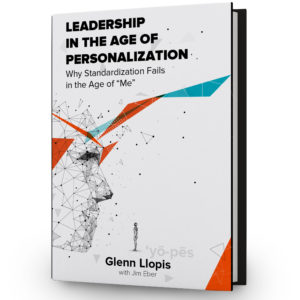 Most organizations and leaders say they want to empower people to contribute at their fullest capacity. But most leaders are never taught how to do that.
Most organizations and leaders say they want to empower people to contribute at their fullest capacity. But most leaders are never taught how to do that.
Those who started their corporate careers 20 years ago or more were given a formula for success by their bosses: Do these 10 actions to drive these 20 outcome; multiply those actions and outcomes across a department, and then across an enterprise.
Those outcomes gave the organization success. Silos were acceptable and even welcomed as a key part of the organizational structure because it made it easier and efficient to predict and focus on those actions that would drive those outcomes.
That’s how most leaders were raised in the corporate world. And that’s how most leaders try to lead today.
But that level of standardization works only when those standardized actions can produce predictable results. If A + B = C every time, then sure — put A’s over here and B’s over there, combine them with some regularity to produce as many C’s as possible, as efficiently as possible. But nothing today is that predictable anymore.
This is a world with mass variance in people. But most leaders formed their identities as leaders in the previous age — the age of actions, outcomes and boxes; the age of standardization.
As a result, leaders are stifling employees, putting them in boxes, controlling their contributions by enforcing standards no one believes in but everyone is accountable to.
Value What People ‘Solve For’ over Title and Department
If someone from Engineering has an idea for Marketing, what would happen? Would that person be ignored for having a lack of expertise? Resented for having the nerve to step into someone else’s lane? Snickered at for having the naiveté to think an “outsider’s” opinion should matter? Or welcomed for having creativity and the boldness to act on it?
Beyond experience and credentials, all individuals have certain things they solve for.
Solve for is an unusual phrase and certainly not anything the metrics and KPIs from the age of standardization were ever designed to measure or value. It’s deeper than a job title or description. It’s a combination of interests, capabilities, personal values, skills and experiences. It’s what someone enjoys and consistently thinks about in a big way.
That person from Engineering might solve for making complex topics clear and understandable. If the Marketing team resents the intrusion from an outsider, they might miss out on valuable input that would make the marketing materials compelling.
Leading in this way requires a new skill: constructive interruption. Interrupt standardized ways of thinking and acting in order to escape the traps. Here are a few standards to interrupt:
- Prioritizing company mission — Every organization has a mission, a vision or value statement, and employees will buy into it on the surface because there is no freedom not to. What is most meaningful to people is to know they have a chance to contribute their unique skills and strengths — no matter the mission.
Start prioritizing individual contribution. - Prioritizing brand identity — This one goes back to Henry Ford, who not only standardized work, but also standardized workers. There was no individuality on the assembly line, and no identities but the Ford brand. The goal was efficiency, and efficiency required a certain level of standardized thinking and standardized action. And that means brand comes first. It also means brand comes at the expense of the individual.
Start prioritizing individual identities. - Prioritizing results — A sales leader said she wanted to shake things up, so she ditched the mandatory 9-to-6 workday and relaxed the dress code. But she said the biggest impact came when they stopped measuring their days by how many sales they closed but, instead, by how many great conversations they had. Her team had a 25-percent increase in revenues the following quarter. All because she took the first step to measure the methods, not reinforce the old results-based approach.
Start prioritizing methods.
Offices are filled with frustrated and exhausted employees, expected to comply with norms that are no longer relevant in today’s reality. People are more informed and diverse than ever. Employees and consumers are proud of their individuality and seek influence, a sense of contribution and purpose like never before.
Let them contribute.
 Glenn Llopis is a Cuban American entrepreneur, best-selling author, speaker and senior advisor to fortune 500 companies and organizations in healthcare, financial, consumer packaged goods and beyond. Leadership in the Age of Personalization
Glenn Llopis is a Cuban American entrepreneur, best-selling author, speaker and senior advisor to fortune 500 companies and organizations in healthcare, financial, consumer packaged goods and beyond. Leadership in the Age of Personalization











